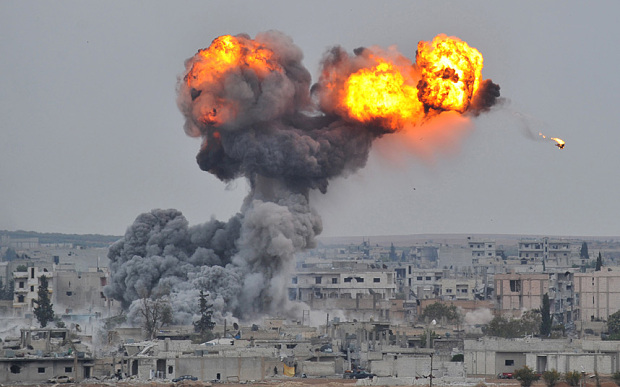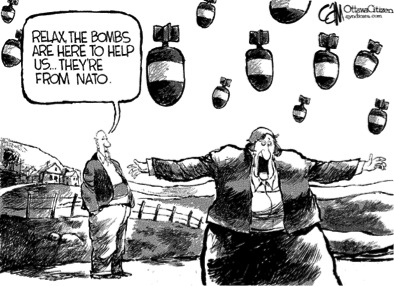Saluons le courage de Justin Trudeau d’avoir su résister à la pression énorme du complexe militaro-industriel, des médias et de la population éprouvée (à Paris et à Québec, suite au 13 novembre et au massacre à Ouagadougou : http://www.artistespourlapaix.org/?p=9209) et d’avoir annulé à partir du 22 février les bombardements du haut des airs : on sait que « ces bombardements de précision » sont en réalité responsables de destructions innommables, de morts et de blessés atroces et de fuites de réfugiés par millions. Et sans pouvoir présenter de statistiques fiables à ce sujet, on imagine aisément combien de vocations djihadistes ils suscitent dans les populations qui les subissent.

Kobané (photo Daily Telegraph)
Comme l’énonce courageusement dans l’Ottawa Citizen d’aujourd’hui ma collègue Peggy Mason de Ceasefire.ca (Institut Rideau), force nous est de constater avec elle l’aveuglement (volontaire?) des médias à reconnaître les effets désastreux des bombardements, comme nous le rapportions dans le point 4 de notre article précédent paix en danger sur http://www.artistespourlapaix.org/p=9670. Kobané et Sinjar, en Syrie, ont été réduites en cendres par ces bombardements qu’Américains et Russes, égaux en barbarie impérialiste, veulent aussi appliquer à Raqqa, Mossoul et Fallujah. Désastre est un mot faible pour décrire la puissance de destruction des bombes et des missiles vantés par les rodomontades patriotiques de François Hollande qui a dépêché son porte-avions.
Mon analyse diffère toutefois de celle de Peggy [1] qui voit les Peshmerga kurdes comme des séparatistes pratiquant le nettoyage ethnique (!). Pourtant Trudeau lui-même a la largeur d’esprit de les reconnaître comme acteurs incontournables, dans la tâche numéro un que le ministre des Affaires étrangères Stéphane Dion a identifiée aujourd’hui: débarrasser en priorité le Moyen-Orient de l’État islamique, reniant ainsi l’objectif principal de M. Harper qui était de démettre du pouvoir le tyran Bachar al-Assad : la pauvre Rona Ambrose s’époumonait donc en conférence de presse, qualifiant de honte nationale le changement de cap de la politique du Canada !
Hélas des nuages sombres que les Libéraux font semblant d’ignorer s’amoncellent à l’horizon avec l’annonce par le Secrétaire américain Ash Carter que les États-Unis s’apprêtent à quadrupler leur budget d’activités militaires à travers l’OTAN. Salué par le Secrétaire général de l’organisme militaire, Jens Stoltenberg, l’effort américain destiné à l’Europe passerait de 800 millions de $ (2015) à 3.4 milliards de $ (2017). La cible de cette orgie de dépenses serait évidemment la Russie. Quand, dans l’histoire contemporaine, a-t-on annoncé le quadruplement des efforts diplomatiques, s’est plainte avec raison Bev Delong, directrice du Réseau canadien pour l’abolition de l’arme nucléaire?
[1] Je me permets cette familiarité, vu nos discussions annuelles lors de nos réunions de Pugwash et du Réseau canadien pour l’abolition de l’arme nucléaire. Incidemment, il y a eu une réunion Pugwash à Doha au Qatar les 23 et 24 janvier derniers portant sur l’Afghanistan, avec une participation des Taliban, des adversaires qu’on ne doit pas refuser d’écouter (c’était la formule souriante du ministre Dion en entrevue aujourd’hui à Radio-Canada : ne jamais refuser d’écouter nos adversaires, ce qui ne veut pas dire les approuver!)
Voici maintenant l’opinion de Peggy Mason, avec sa solide conclusion que nous endossons pleinement : le Canada aurait davantage d’impact en se retirant complètement de la mission militaire, en concentrant ses efforts sur une stabilisation régionale, sur des mesures humanitaires et surtout, en agissant comme catalyseur d’une nouvelle stratégie qui enverrait des missions diplomatiques de paix en Syrie, en Libye et au profit de réformes de gouvernance en Irak.
Published in the Ottawa Citizen online, February 8, 2016
The U.S.-led coalition against Islamic State (ISIL) is in utter disarray. Things are going so badly that some Arab members of the coalition who left the bombing campaign in Iraq and Syria to focus on Yemen now say they are ready to come back and provide ground forces. In the meantime, believing that President Bashar Assad is the best bulwark against ISIL, Russian air strikes are decimating coalition allies on the ground, blowing up the fragile UN-backed peace talks at the same time.ISIL is proving so difficult to dislodge that the U.S., under cover of outrage over the November Paris attacks, has relaxed its targeting restrictions. And ISIL advances in Libya have the U.S. and U.K. openly musing about extending the war into that country. An urgent course correction is long overdue.

Relaxe! Ces bombes viennent nous aider… elles proviennent de l’OTAN
The non-military aspects of the new Liberal plan, including diplomatic peacemaking in Syria, and promoting regional stability and improving Iraqi governance, are important steps in the right direction. However, the military components of the Liberal response, which involve not only an expanded training role but continued participation in the air campaign through reconnaissance and refuelling, will only heighten Canadian involvement in an ever-deepening quagmire.
Since the announcement by Justin Trudeau that Canada would be withdrawing its CF-18s from the coalition bombing campaign, there has been an incessant media drumbeat demanding that he rethink this decision. The demand only intensified after the Paris attacks, as if the decision to change Canada’s role in the coalition was based on a misunderstanding of the threat and not on a desire to be more effective.
The federal government can be rightly castigated for not articulating more forcefully its reasons for wanting to adjust the role. But this does not excuse the failure of the Canadian media to consider the actual effect on the ground of the bombing campaign.
The so-called coalition “victories,” in which cities such as Kobane and Sinjar in Syria, and Ramadi in Iraq, are “liberated” with the help of massive air strikes, have resulted in the destruction of these cities. They are reduced to rubble, leaving nothing to house or sustain returning populations. Yet the American secretary of defence has made clear that this is his plan for cities such as Raqqa in Syria and Mosul and Fallujah in Iraq. If this plan is carried out, then the almost certain result will be far fewer habitable cities and far greater numbers of displaced, destitute populations.
But what about Canada’s intention to increase its training of local Iraqi forces? Surely that is another step in the right direction. Unfortunately, the devil is in the detail. Training the Peshmerga, which Canada is already doing, puts us in the position of helping fighters whose goal is not to liberate Iraq from ISIL but to create an independent Kurdistan. Particularly troubling are credible allegations from Amnesty International that Kurdish forces are engaged in “ethnic cleansing” of areas they retake from ISIL.
And we still have precious few Iraqi Sunnis to train since, in their stronghold of Anbar province, Sunni tribes have largely chosen what they see as the lesser of two evils, ISIL, over a corrupt and sectarian Iraqi government. In other words, our training should take a back seat to that part of the Canadian plan intended to focus on Iraqi governance.
As for Syria, as long as the civil war continues unabated, ISIL cannot be effectively contained.
Canada would have far greater impact if we pulled out of the military mission altogether and concentrated on regional stabilization, humanitarian measures and, above all, acting as a catalyst for a new strategy that puts diplomatic peacemaking in Syria and Libya and governance reforms in Iraq at the heart of coalition efforts.
Aucun commentaire jusqu'à présent.